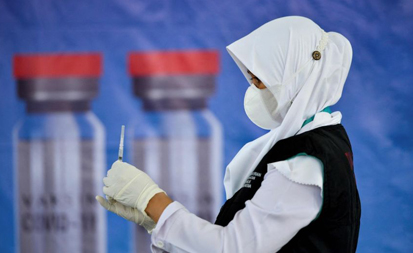Indonesia communicates with WHO to become global vaccine hub, says minister
According to the Indonesia health minister, the country is in contact with the World Health Organization (WHO) and other six drug companies to become a global hub for manufacturing vaccines. Budi Gunadi Sadikin said in an

According to the Indonesia health minister, the country is in contact with the World Health Organization (WHO) and other six drug companies to become a global hub for manufacturing vaccines.
Budi Gunadi Sadikin said in an interview, detailing the ambitious strategy for the first time, that Indonesia would initialize the initiative by prioritizing purchases of COVID-19 vaccines from companies that shared technology and set up facilities in Indonesia.
He said, “We are working with the WHO to be one of the global manufacturing hubs for mRNA,” also adding that he had directly lobbied WHO Director-General Tedros Adhanom Ghebreyesus during a trip earlier this month to Europe.
“The WHO has pointed to South Africa as the first location, and I said that logically Indonesia should be the second.”
The new “technology transfer hubs” are the part of a WHO strategy to distribute vaccine more widely globally and build capacity in developing countries to make new generation vaccines like Moderna (MRNA.O) and Pfizer’s (PFE.N) nucleic acid-based mRNA jabs which can be quickly adapted to handle new virus variants.
Efforts to develop a base for COVID-19 vaccine production in South Africa will be focusing on trying to replicate Moderna’s shot, but because of the lack of progress in the communication with the U.S. Company results in the delay in project, said a senior WHO official.
Budi told that Indonesia was keen to build expertise in mRNA vaccines, as well as viral vector shots such as those produced by AstraZeneca (AZN.L).
A WHO spokesperson said Indonesia was one of the 25 low and middle income countries to express interest in hosting a vaccine hub but declined to say if it was a leading candidate.
According to Budi, Indonesia was well-placed to export vaccines around the world, especially when it is the world’s most populous Muslim-majority country and could guarantee that its jabs were halal, or permissible according to Islam.
Indonesia has grappled with one of the most severe outbreaks of COVID-19 in Asia and has recorded more than 4.1 million infections and 139,000 deaths, although public health experts say the true figures are likely several times higher.
Indonesia’s rate of infections and deaths has declined steadily in recent weeks but, with only 25 per cent of its target population of 208 million people fully inoculated against COVID-19, it still has a major vaccination effort ahead, especially as it likely will have to provide third booster shots.
Budi said Indonesian pharmaceutical companies are in discussions with vaccine manufacturers and developers Anhui, Walvax (300142.SZ), Sinovac (SVA.O), Genexine (095700.KQ), Arcturus Therapeutics and Novavax (NVAX.O). The talks range from basic “fill and finish” to upstream production and research and development, he added.
“We open the same opportunities also to AstraZeneca. We are also open to the existing partner Pfizer,” he said. “We are open to anyone.”
Bambang Heriyanto, the corporate secretary of Bio Farma, Indonesia’s largest state-owned drug company, confirmed the talks were on and the first step was to collaborate on the transfer of technology. It would take two or three years to build a fully operational production facility, he said.
Budi said Indonesia would use its leadership of the G-20 group of countries starting in December to promote global health security and prepare for the next pandemic after the coronavirus, also known as SARS-CoV-2.
“No one can guarantee that SARS-CoV-3 and 4 will not come.”






